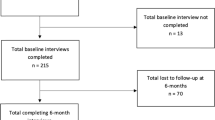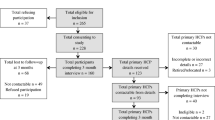Abstract
The objectives of this paper are to to measure levels of perceived injustice in whiplash victims and determine the relationship to recovery at 6-month post-injury. Consecutive acute whiplash patients completed the Injustice Experience Questionnaire, at presentation, and also 3- and 6-month post-injury. At each of these two follow-up points, participants were examined for recovery. Of an initial 134 participants, 130 participants were followed up at 3 months and 124 at 6 months. At the 3-month follow-up, 62 % (80/130) of participants reported recovery from their injuries. At 6 months, 80 % (99/124) reported recovery. The initial Injustice Experience Questionnaire score was low, with a mean score of 6.0 ± 1.0 (range 5–10) out of a maximum of 48. The mean score at 3-month follow-up had increased in the cohort to 7.4 ± 1.6 (range 5–11). At 6-month post-injury, the mean of the Injustice Experience Questionnaire score for the cohort who still reported lack of recovery (25/124 participants) was 15.0 ± 6.0 (range 5–31), while that for the recovered group remained low at 8.2 ± 3.9 (range 5–11). In the primary care setting, a significant proportion of whiplash patients who have not recovered by 3-month post-injury subsequently develop higher levels of perceived injustice by 6-month post-injury. The development of high levels of perceived injustice at 6-month post-injury appears to follow the development of chronic pain and a lack of recovery at 3 months and, at that point, becomes a risk factor for lack of recovery thereafter.

Similar content being viewed by others
References
Ferrari R (2010) Predicting central sensitization—whiplash patients. Aust Fam Physician 39:863–866
Ferrari R, Louw D (2011) Coping style as a predictor of compliance with referral to active rehabilitation in whiplash patients. Clin Rheumatol 30:1221–1225
Ferrari R (2012) Correlation between self-reported recovery and central sensitization in whiplash patients. J Sport Health Sci 1:61–64
Ferrari R, Louw D (2013) Effect of a pain diary use on recovery from acute whiplash injury, a cohort study. J Zhejiang Univ Sci B 14:1049–1053
Ferrari R (2014) Predicting recovery from whiplash injury in the primary care setting. Aust Fam Physician (in press)
Carroll LJ, Holm L, Ferrari R, Ozegovic D, Cassidy JD (2009) Recovery in whiplash-associated disorders: do you get what you expect? J Rheumatol 36:1063–1070
Ozegovic D, Carroll LJ, Cassidy JD (2009) Does expecting mean achieving? The association between expecting to return to work and recovery in whiplash associated disorders: a population-based prospective cohort study. Eur Spine J 18:893–899
Carroll LJ, Ferrari R, Cote P, Cassidy JD (2014) Coping and recovery in whiplash-associated disorders: early use of passive coping strategies is associated with slower recovery of neck pain and pain-related disability. Clin J Pain 30:1–8
Michaleff ZA, Maher CG, Lin CW, Rebbeck T, Jull G, Latimer J, Connelly L, Sterling M (2014) Comprehensive physiotherapy exercise programme or advice for chronic whiplash (PROMISE): a pragmatic randomised controlled trial. Lancet 2014 Apr 3
Rodero B, Luciano JV, Montero-Marín J, Casanueva B, Palacin JC, Gili M, López del Hoyo Y, Serrano-Blanco A, Garcia-Campayo J (2012) Perceived injustice in fibromyalgia: psychometric characteristics of the Injustice Experience Questionnaire and relationship with pain catastrophising and pain acceptance. J Psychosom Res 73:86–91
Sullivan MJL, Adams A, Horan S (2008) The role of perceived injustice in the experience of chronic pain and disability: scale development and validation. J Occup Rehabil 18:249–261
Sullivan MJ, Davidson N, Garfinkel B (2009) Perceived injustice is associated with heightened pain behavior and disability in individuals with whiplash injuries. Psychol Inj Law 2:238–247
Sullivan MJ, Thibault P, Simmonds MJ, Milioto M, Cantin AP, Velly AM (2009) Pain, perceived injustice and the persistence of post-traumatic stress symptoms during the course of rehabilitation for whiplash injuries. Pain 145:325–331
Scott W, Wideman TH, Sullivan MJL (2013) Further validation of a measure of injury-related injustice perceptions to identify risk for occupational disability: a prospective study of individuals with whiplash injury. J Occup Rehabil 23:557–565
Ferrari R, Russell AS, Kelly AJ (2006) Assessing whiplash recovery—the Whiplash Disability Questionnaire. Aust Fam Physician 35:653–654
Ferrari R, Russell AS (2008) Whiplash: social interventions and solutions. J Rheumatol 35:2300–2302
Scott W, Trost Z, Bernier E, Sullivan MJ (2013) Anger differentially mediates the relationship between perceived injustice and chronic pain outcomes. Pain 154:1691–1698
Conflict of interest
None
Author information
Authors and Affiliations
Corresponding author
Rights and permissions
About this article
Cite this article
Ferrari, R. A prospective study of perceived injustice in whiplash victims and its relationship to recovery. Clin Rheumatol 34, 975–979 (2015). https://doi.org/10.1007/s10067-014-2693-0
Received:
Revised:
Accepted:
Published:
Issue Date:
DOI: https://doi.org/10.1007/s10067-014-2693-0




